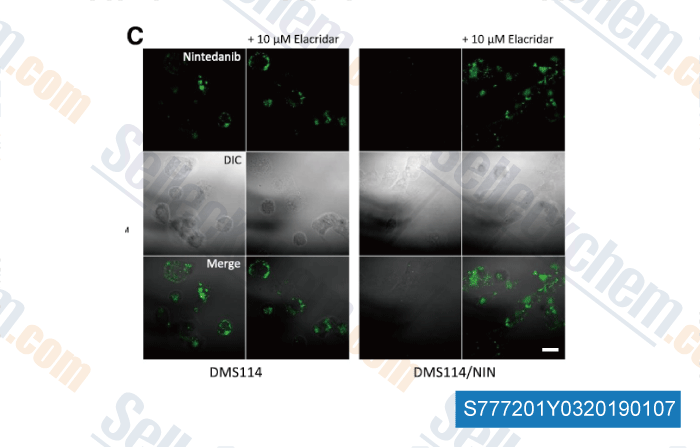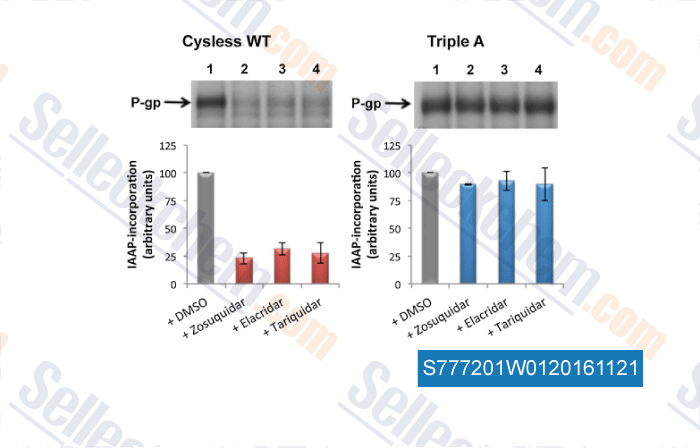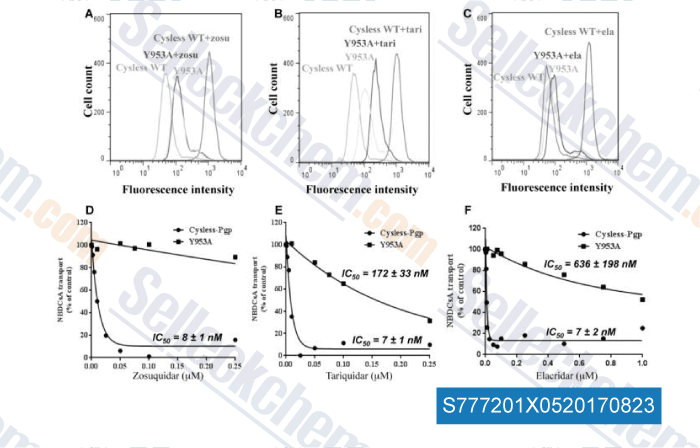|
Toll Free: (877) 796-6397 -- USA and Canada only -- |
Fax: +1-832-582-8590 Orders: +1-832-582-8158 |
Tech Support: +1-832-582-8158 Ext:3 Please provide your Order Number in the email. |
Technical Data
| Formula | C34H33N3O5 |
||||||
| Molecular Weight | 563.64 | CAS No. | 143664-11-3 | ||||
| Solubility (25°C)* | In vitro | DMSO | 41 mg/mL (72.74 mM) | ||||
| Water | Insoluble | ||||||
| Ethanol | Insoluble | ||||||
| In vivo (Add solvents to the product individually and in order) |
|
||||||
|
* <1 mg/ml means slightly soluble or insoluble. * Please note that Selleck tests the solubility of all compounds in-house, and the actual solubility may differ slightly from published values. This is normal and is due to slight batch-to-batch variations. * Room temperature shipping (Stability testing shows this product can be shipped without any cooling measures.) |
|||||||
Preparing Stock Solutions
Biological Activity
| Description | Elacridar (GF120918, GW120918, GG918, GW0918) is a potent P-gp (MDR-1) and BCRP inhibitor. | ||
|---|---|---|---|
| Targets |
|
||
| In vitro | Elacridar inhibits P-glycoprotein (P-gp) labeling by [3H]azidopine with a IC50 of 0.16 μM. [2] In Caki-1 and ACHN cells, elacridar ( 2.5 μM) significantly ihibits the cell growth. The P-glycoprotein activity is found to be inhibited by elacridar. The combination of elacridar and sunitinib lead to a significant reduction in ABC Sub-family B Member 2 (ABCG2) expression in 786-O cells. [3] | ||
| In vivo | Oral co-administration of elacridar (100 mg/kg, p.o.) and crizotinib increases the plasma and brain concentrations and brain-to-plasma ratios of crizotinib in wild-type mice, equaling the levels in Abcb1a/1b; Abcg2-/- mice. [1] In friend leukemia virus stain B mice, the brain-to-plasm partition coefficient (Kp, brain) of elacridar is 0.82, 0.43, and 4.31 after intravenous (2.5 mg/kg), intraperitoneal (100 mg/kg), and oral (100 mg/kg) treatment, respectively. [4] In Mrp4(-/-) mice, elacridar fully inhibits P-gp mediated transport of topotecan, without siginificant effects on Bcrp1-mediated transport. [5] |
Protocol (from reference)
| Kinase Assay:[2] |
|
|---|---|
| Cell Assay:[3] |
|
| Animal Study:[1] |
|
References
Customer Product Validation

-
Data from [Data independently produced by , , J Exp Clin Cancer Res, 2017, 36(1):122]

-
Data from [Data independently produced by , , Biochem Pharmacol, 2016, 101:40-53.]

-
Data from [Data independently produced by , , Biochem Pharmacol, 2016, 101:40-53]
Selleck's Elacridar (GF120918) has been cited by 16 publications
| Ritonavir reverses resistance to docetaxel and cabazitaxel in prostate cancer cells with acquired resistance to docetaxel [ Cancer Drug Resist, 2024, 7:3] | PubMed: 38318527 |
| Abcg2a is the functional homolog of human ABCG2 expressed at the zebrafish blood-brain barrier [ bioRxiv, 2023, 10.1101/2023.05.18.539313] | PubMed: 37425689 |
| Abcg2a is the functional homolog of human ABCG2 expressed at the zebrafish blood-brain barrier [ bioRxiv, 2023, 2023.05.18.539313] | PubMed: 37425689 |
| Activation of STAT3 through combined SRC and EGFR signaling drives resistance to a mitotic kinesin inhibitor in glioblastoma [ Cell Rep, 2022, 39(12):110991] | PubMed: 35732128 |
| Overcoming Resistance to Anti–Nectin-4 Antibody-Drug Conjugate [ Mol Cancer Ther, 2022, 21 (7): 1227–1235.] | PubMed: None |
| Overcoming Resistance to Anti-nectin-4 Antibody-Drug Conjugate [ Mol Cancer Ther, 2022, molcanther.0013.2022] | PubMed: 35534238 |
| ETV7 regulates breast cancer stem-like cell features by repressing IFN-response genes [ Cell Death Dis, 2021, 12(8):742] | PubMed: 34315857 |
| Estradiol regulates intestinal ABCG2 to promote urate excretion via the PI3K/Akt pathway [ Nutr Metab (Lond), 2021, 18(1):63] | PubMed: 34144706 |
| Therapeutic Targeting of MDR1 Expression by RORγ Antagonists Resensitizes Cross-Resistant CRPC to Taxane via Coordinated Induction of Cell Death Programs. [ Mol Cancer Ther, 2020, 19(2):364-374] | PubMed: 31712394 |
| Multiple ABCB1 transcriptional fusions in drug resistant high-grade serous ovarian and breast cancer. [ Nat Commun, 2019, 10(1):1295] | PubMed: 30894541 |
RETURN POLICY
Selleck Chemical’s Unconditional Return Policy ensures a smooth online shopping experience for our customers. If you are in any way unsatisfied with your purchase, you may return any item(s) within 7 days of receiving it. In the event of product quality issues, either protocol related or product related problems, you may return any item(s) within 365 days from the original purchase date. Please follow the instructions below when returning products.
SHIPPING AND STORAGE
Selleck products are transported at room temperature. If you receive the product at room temperature, please rest assured, the Selleck Quality Inspection Department has conducted experiments to verify that the normal temperature placement of one month will not affect the biological activity of powder products. After collecting, please store the product according to the requirements described in the datasheet. Most Selleck products are stable under the recommended conditions.
NOT FOR HUMAN, VETERINARY DIAGNOSTIC OR THERAPEUTIC USE.
